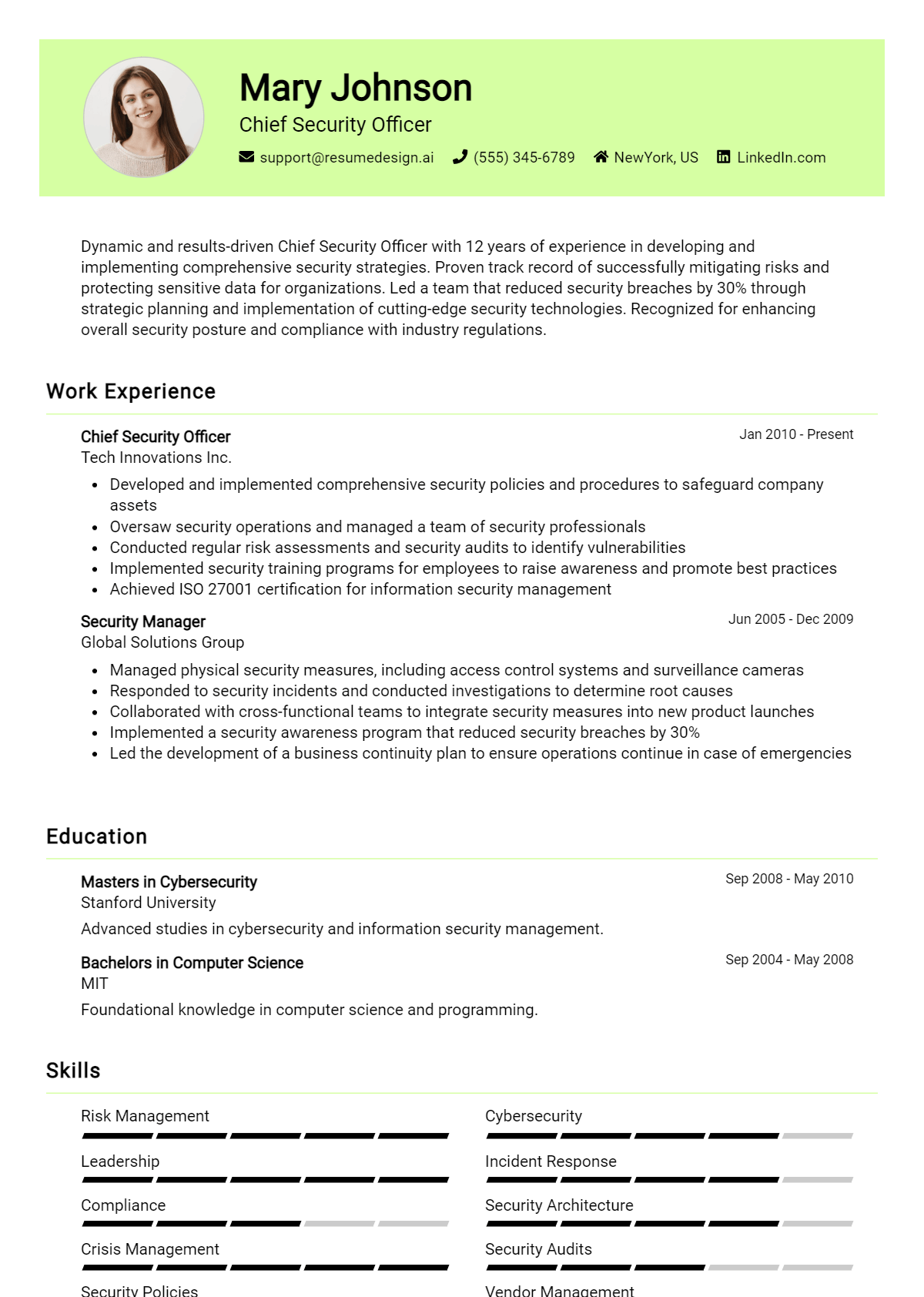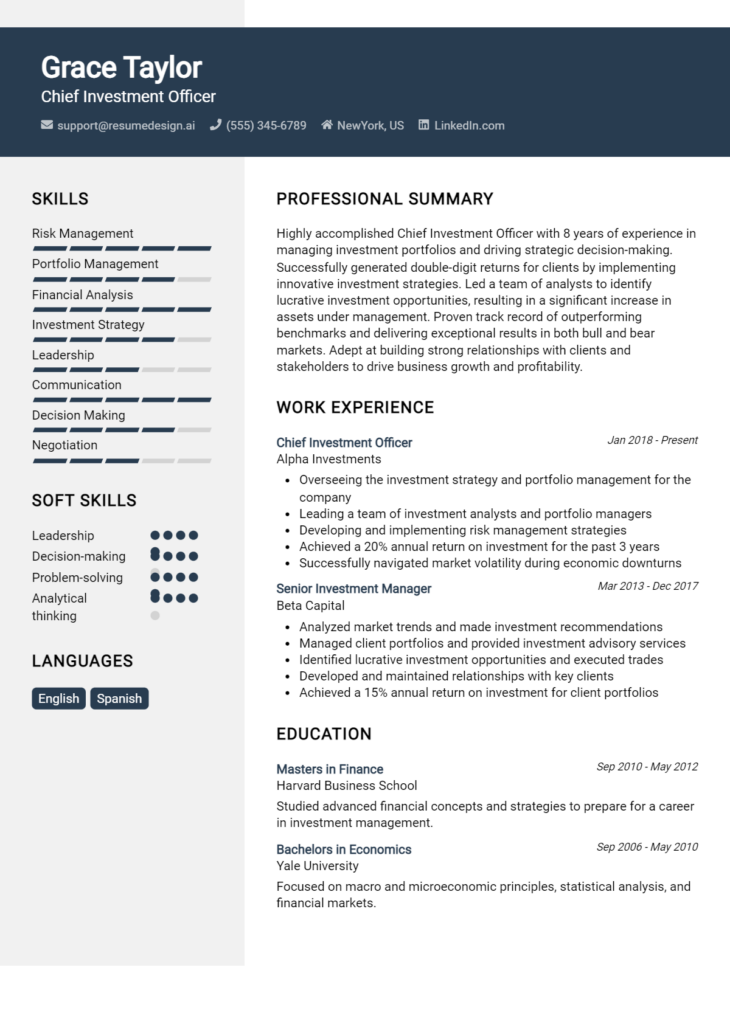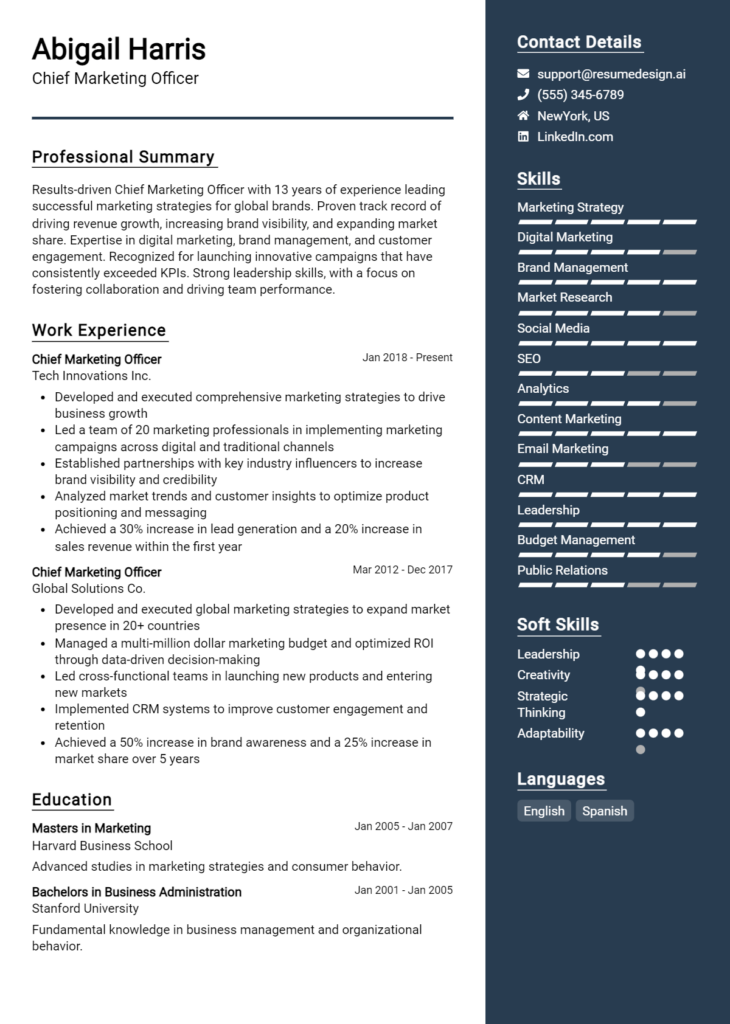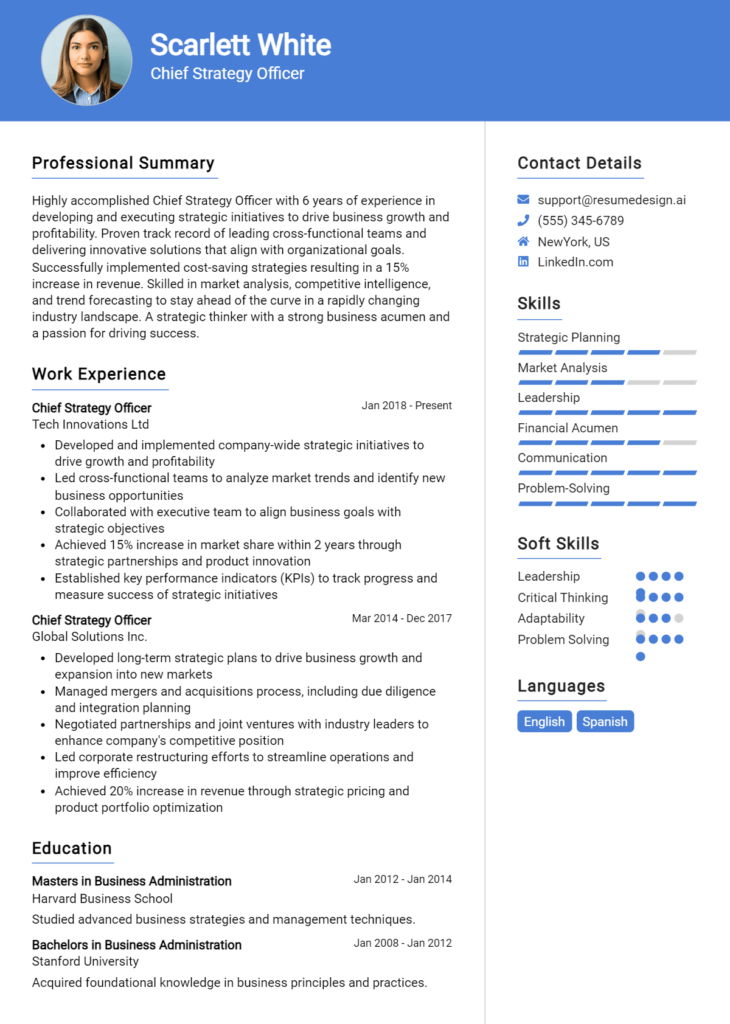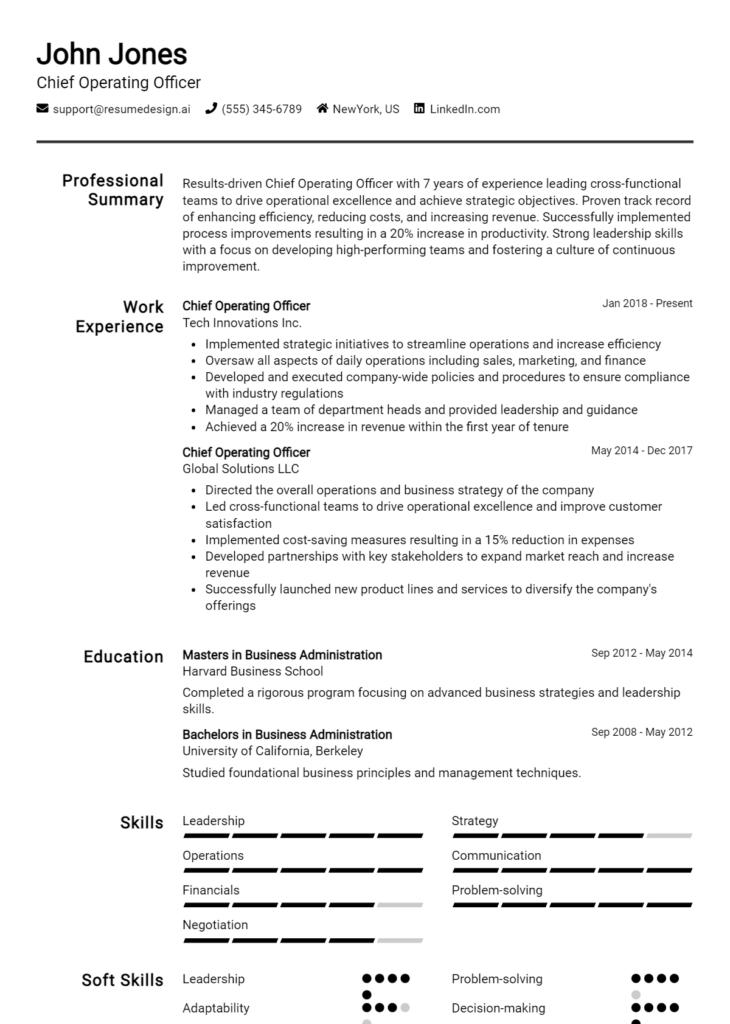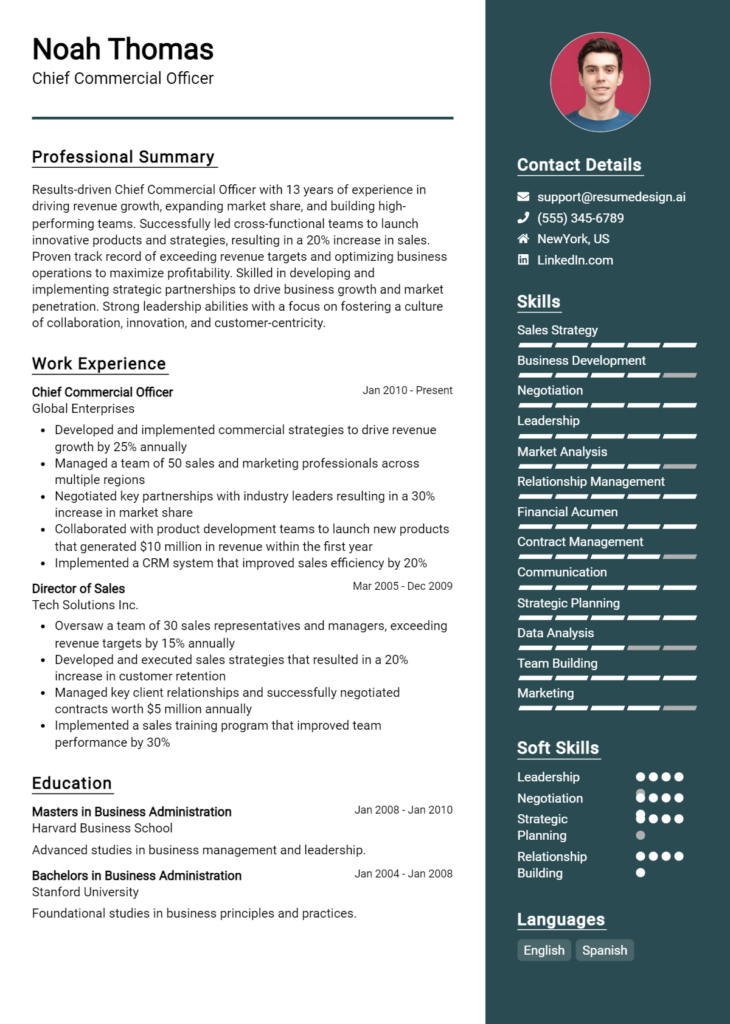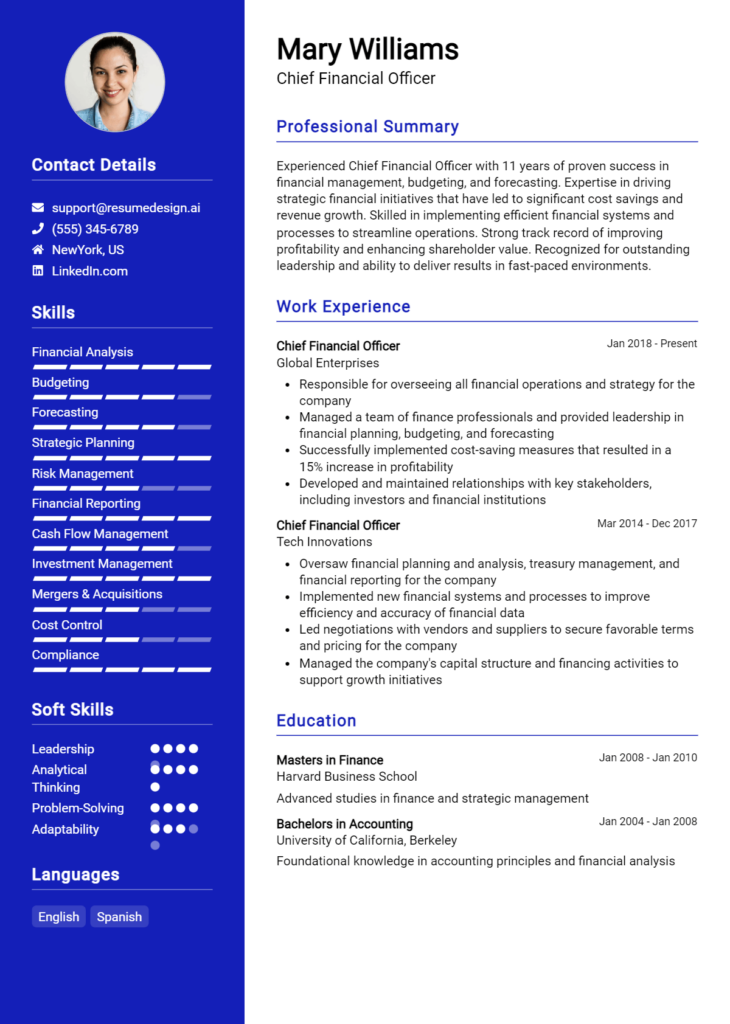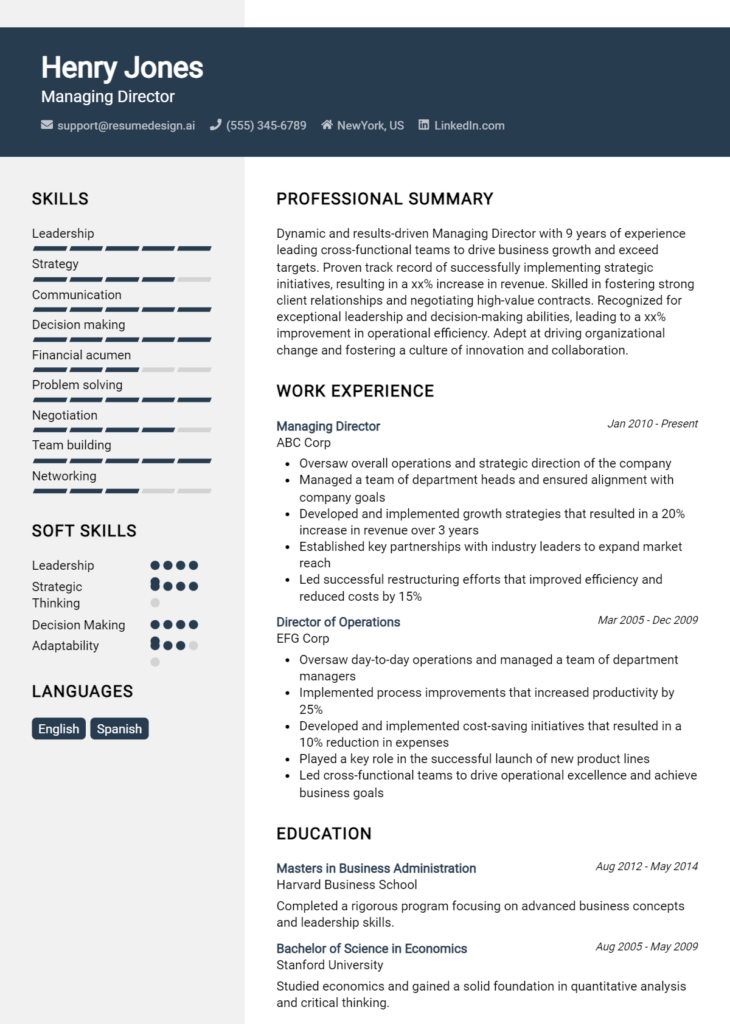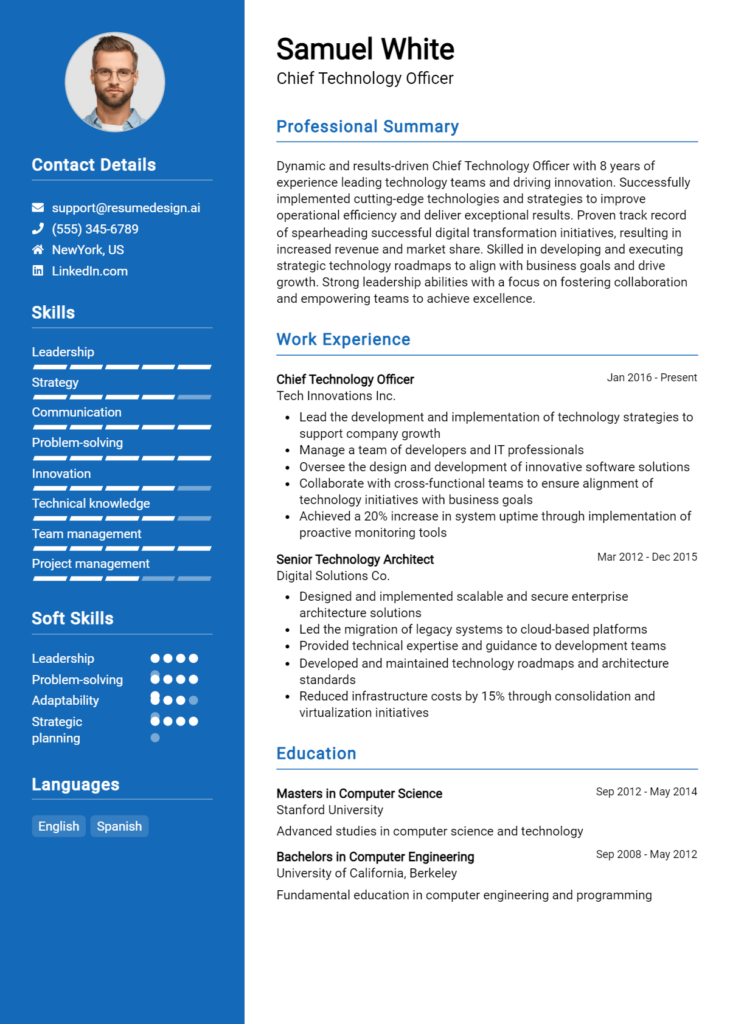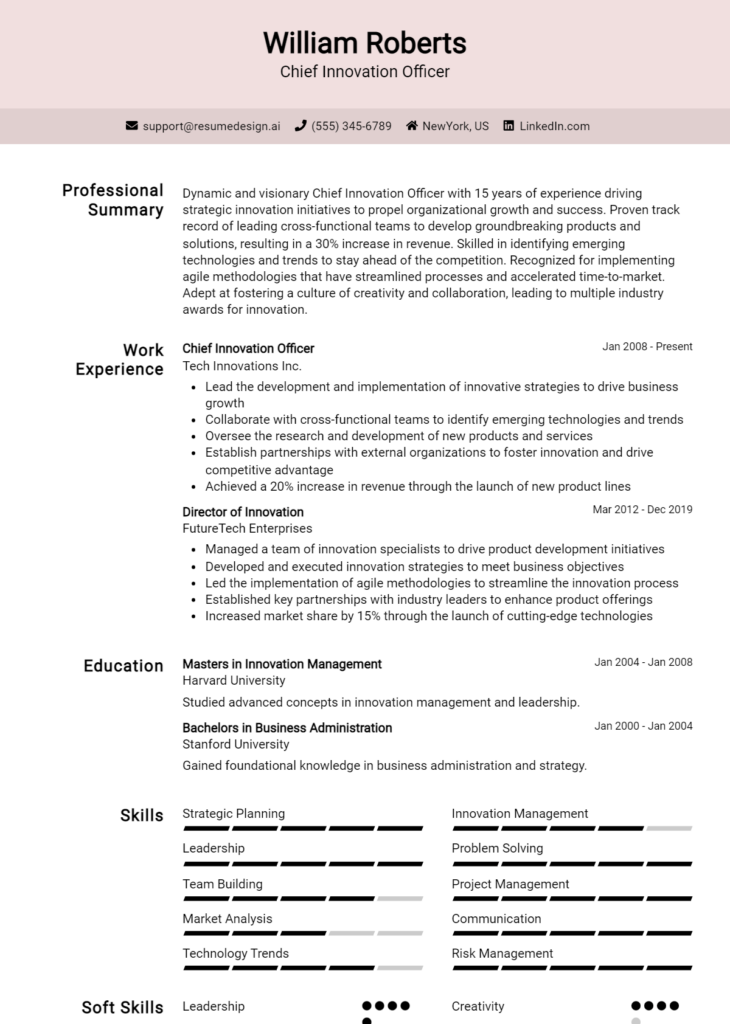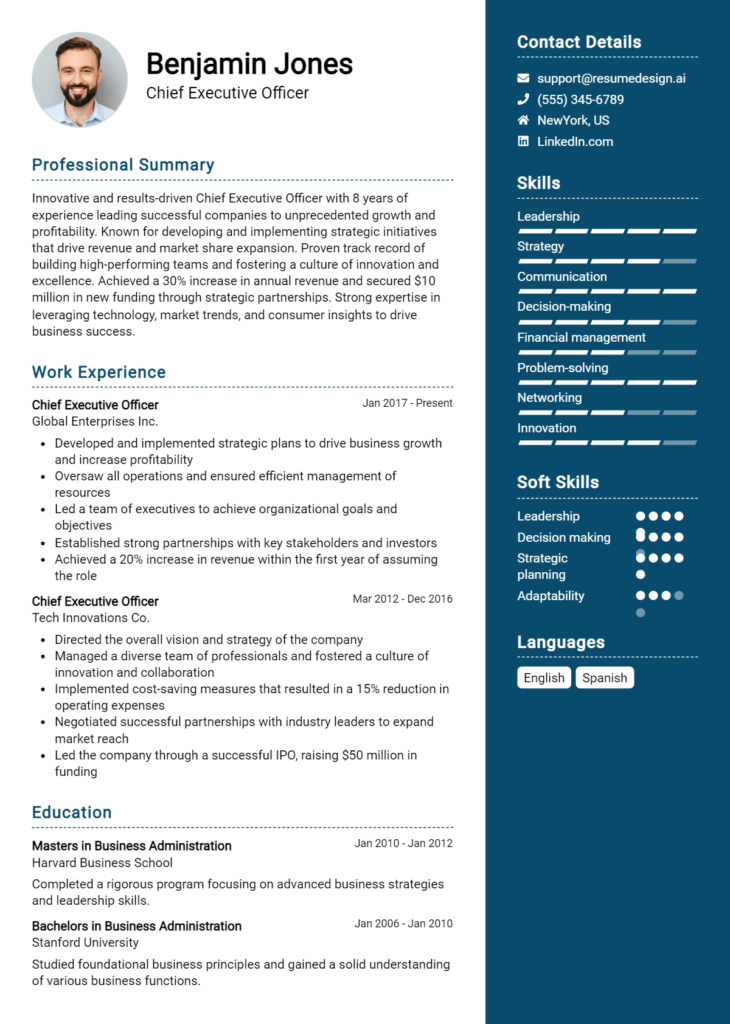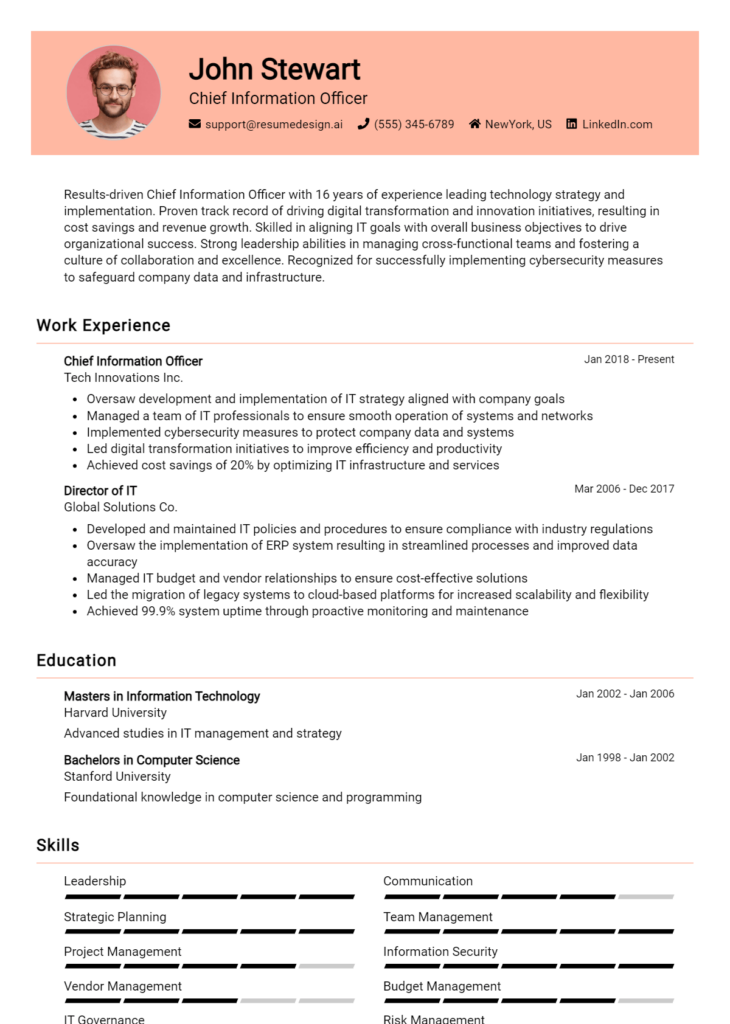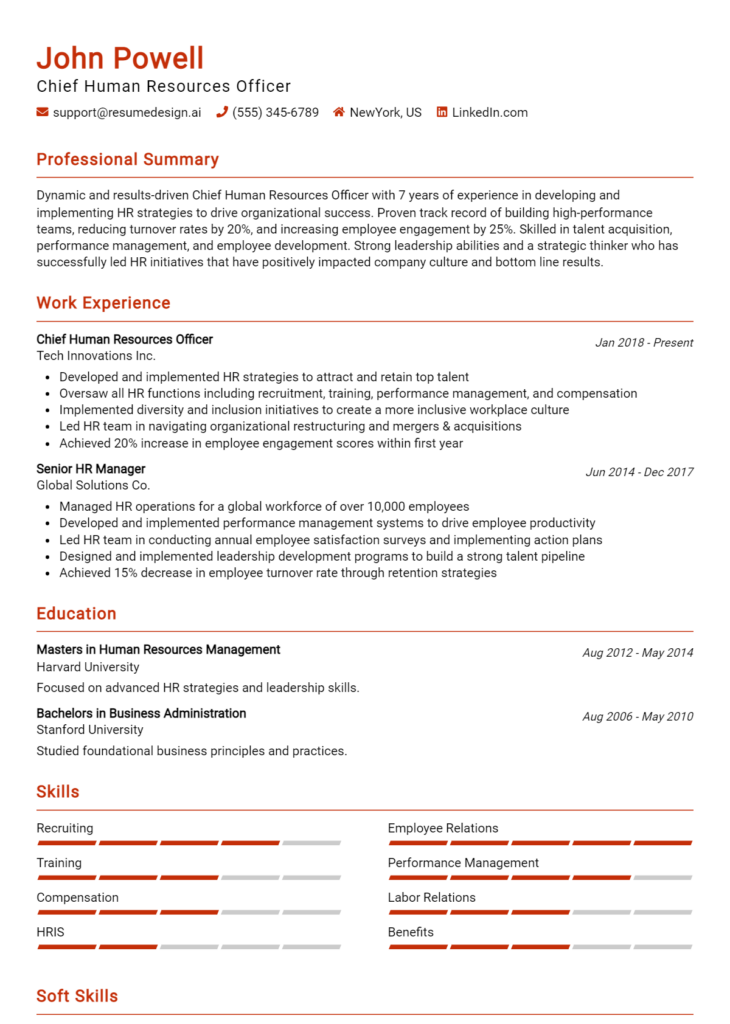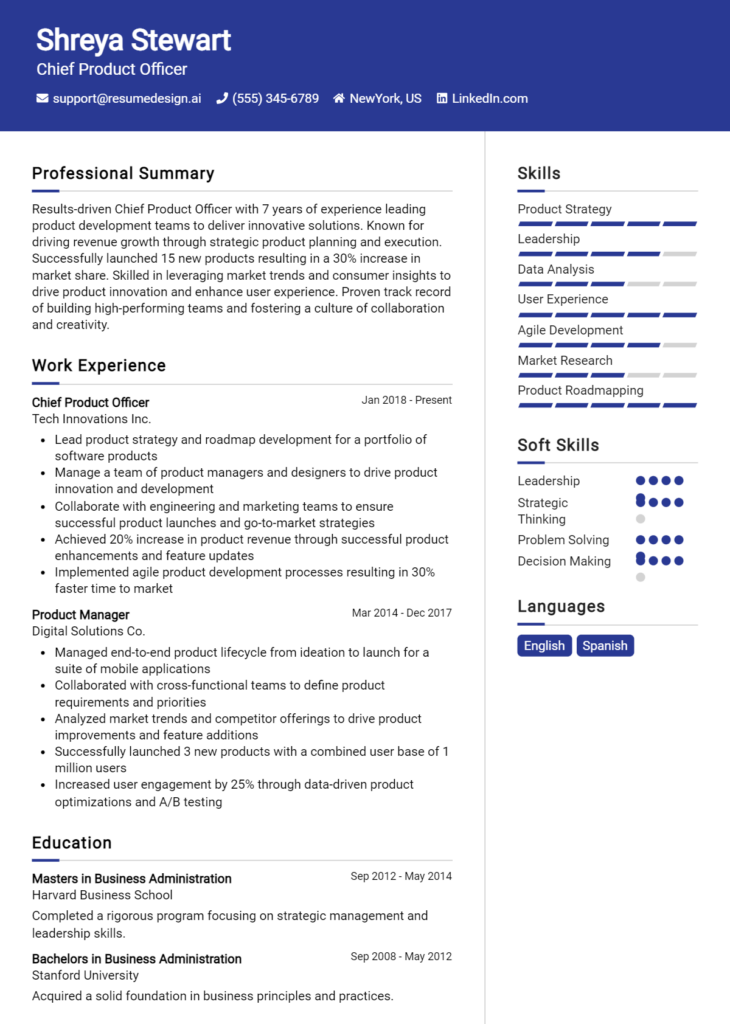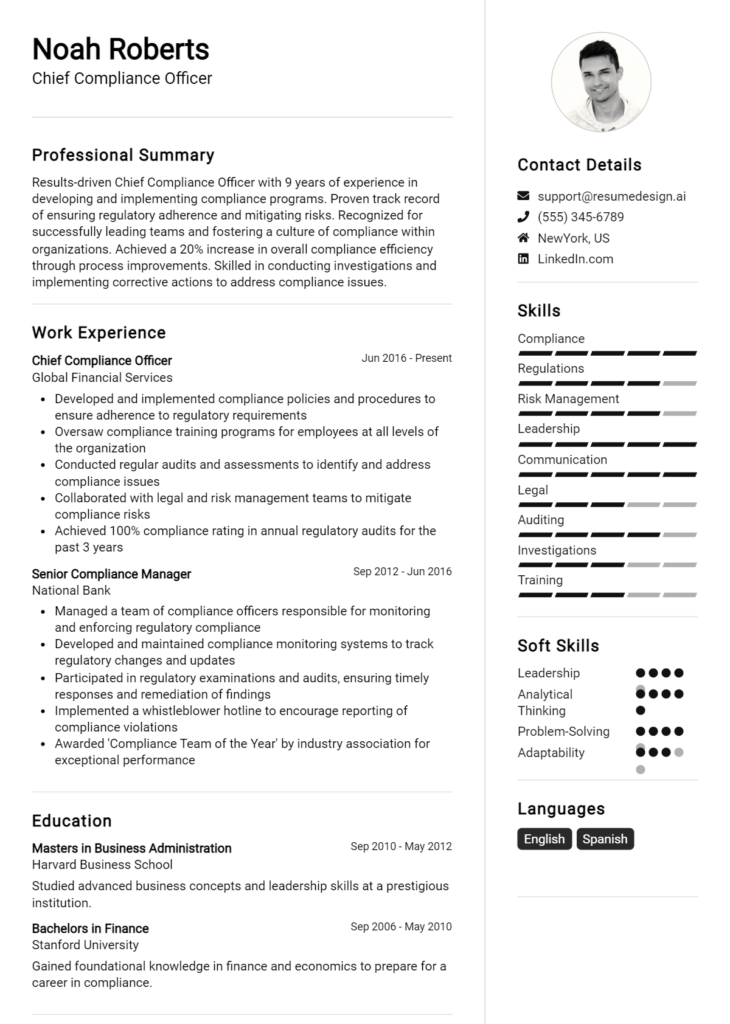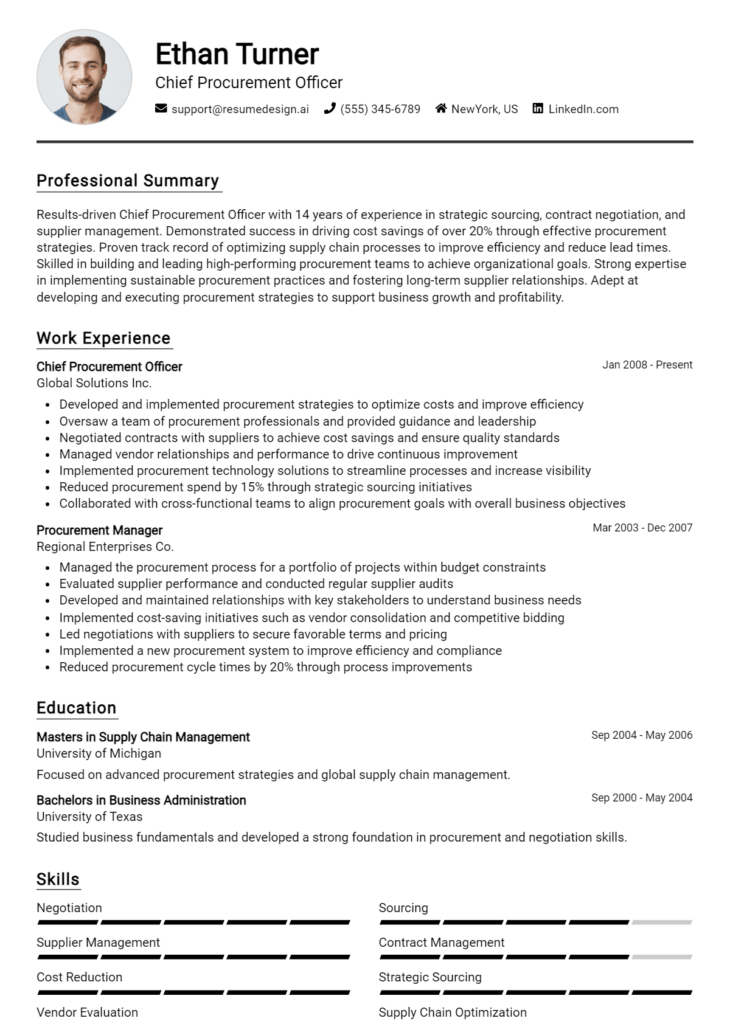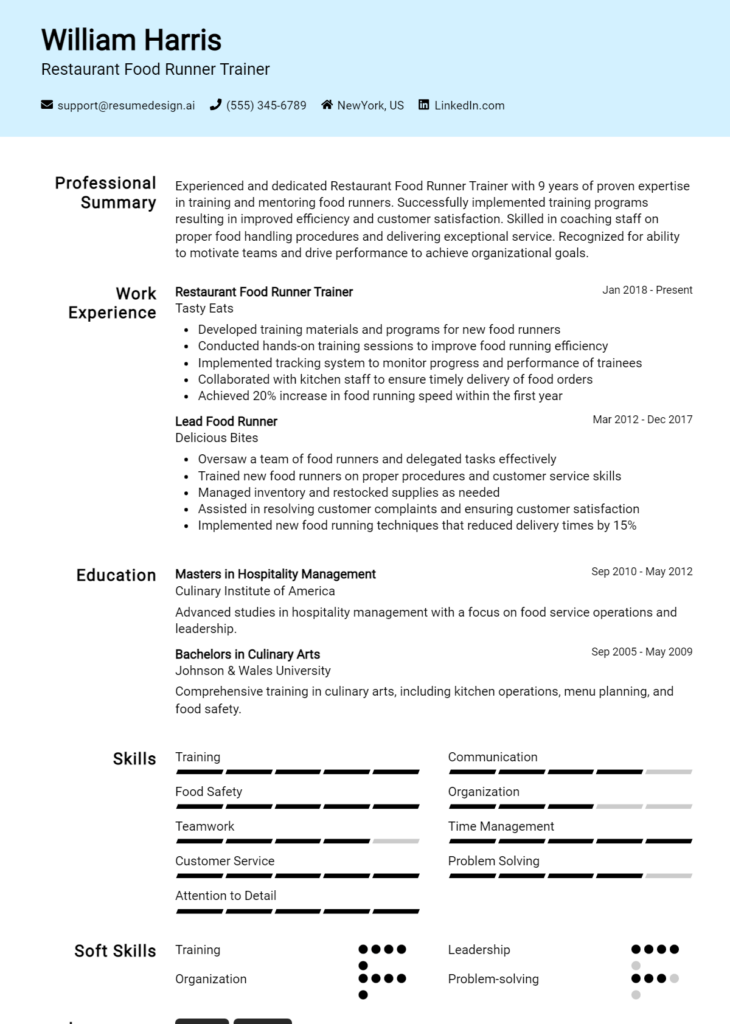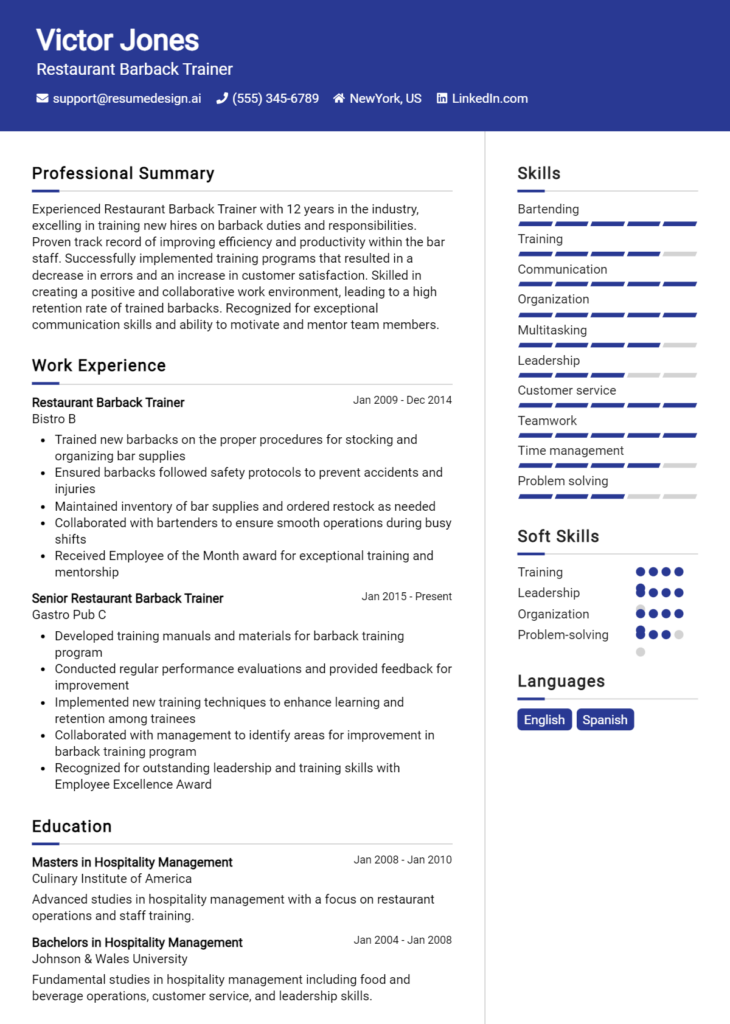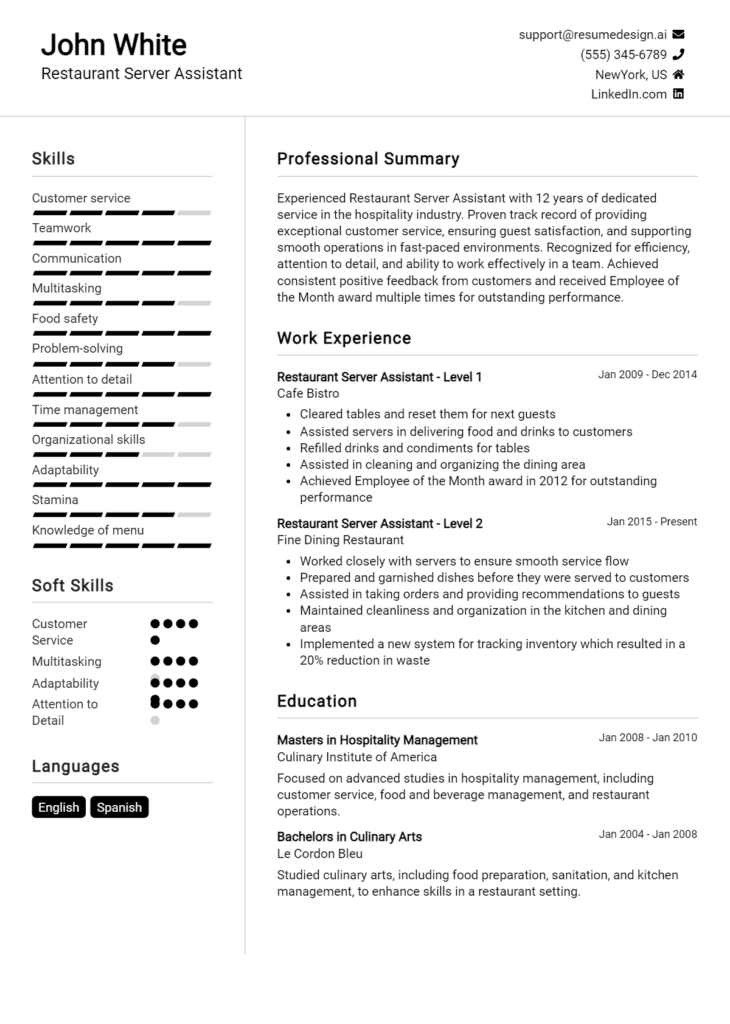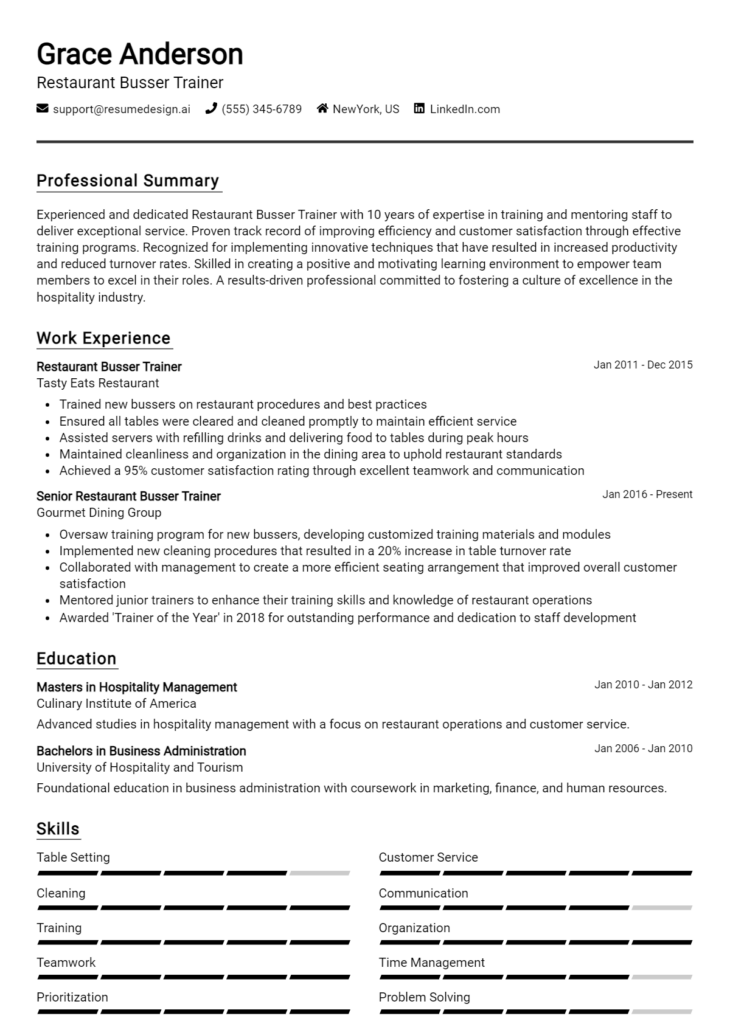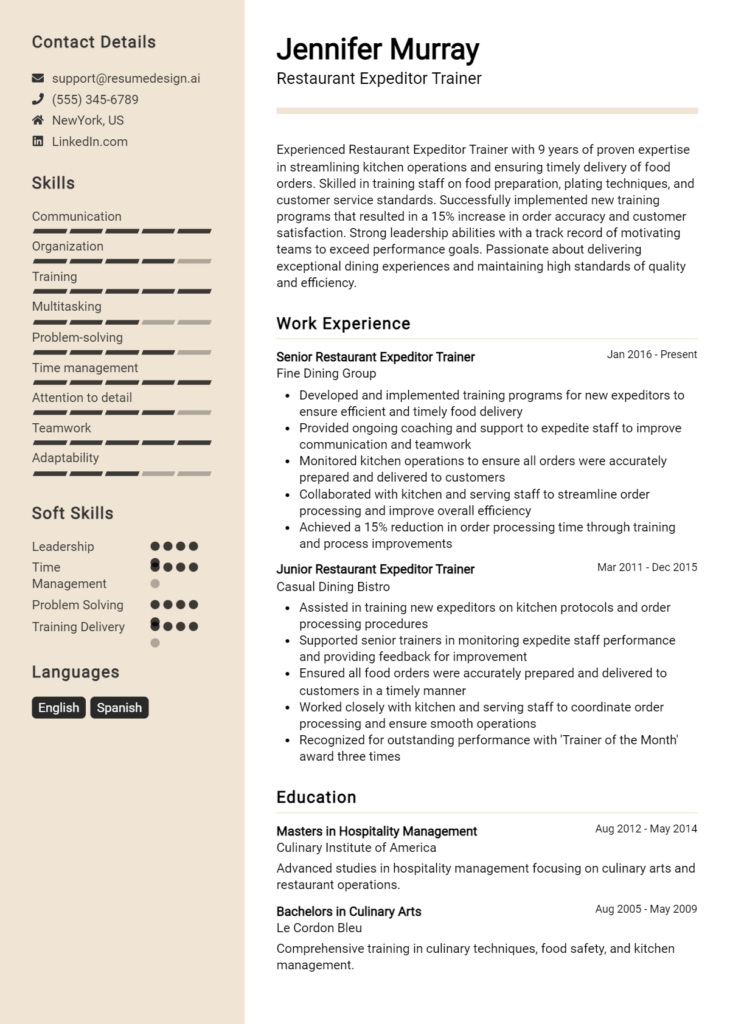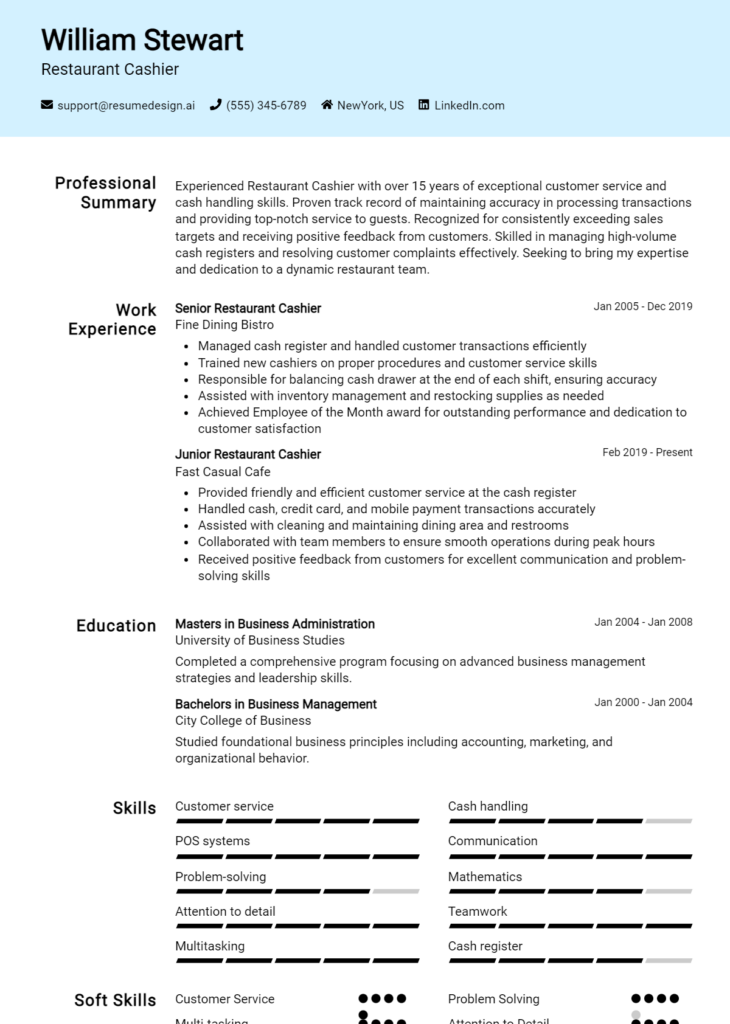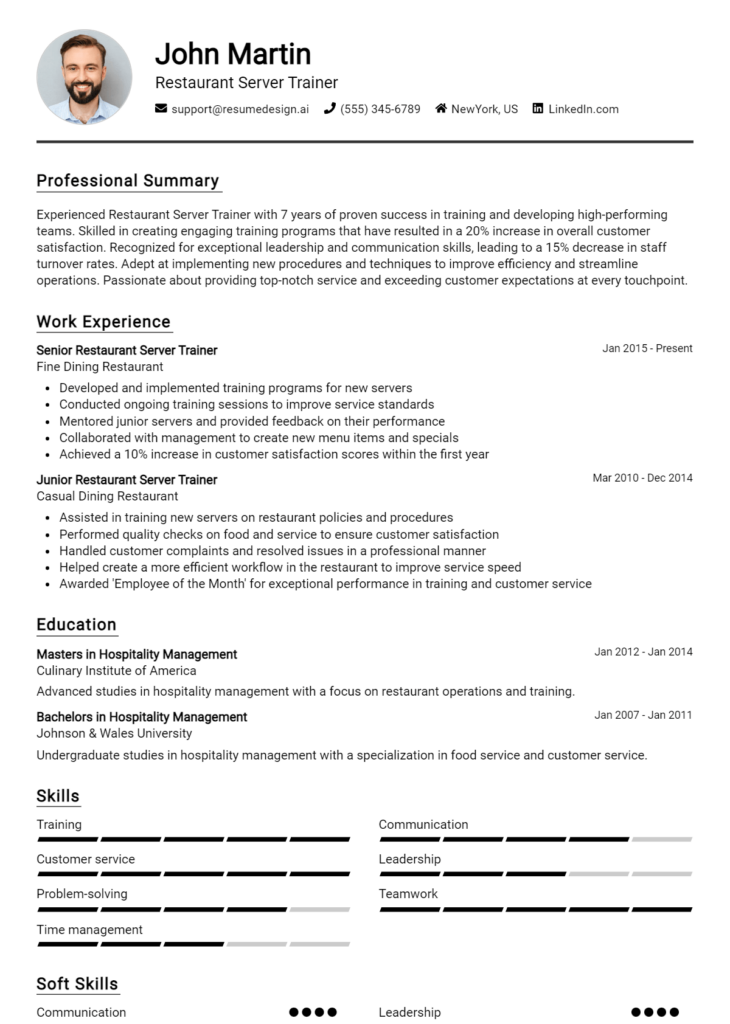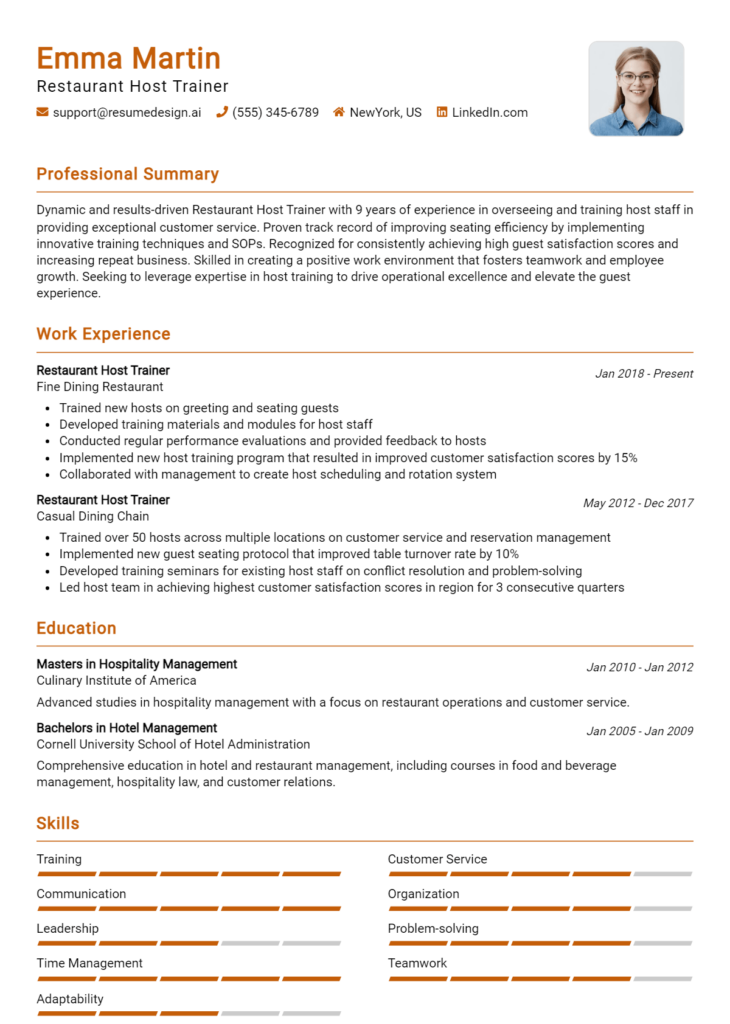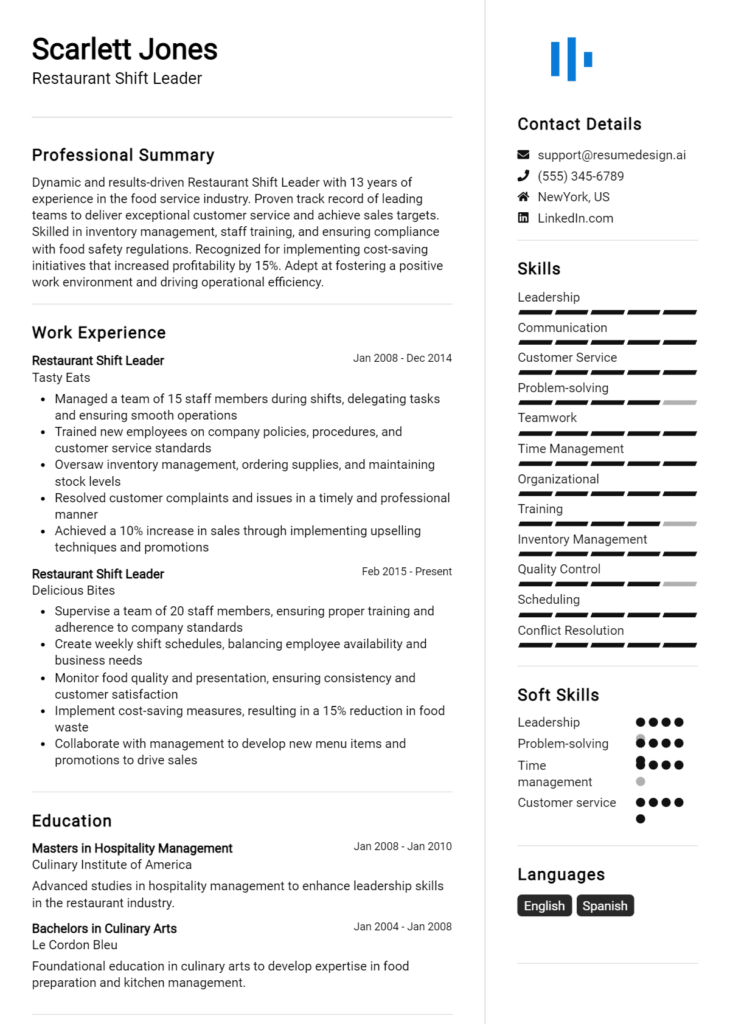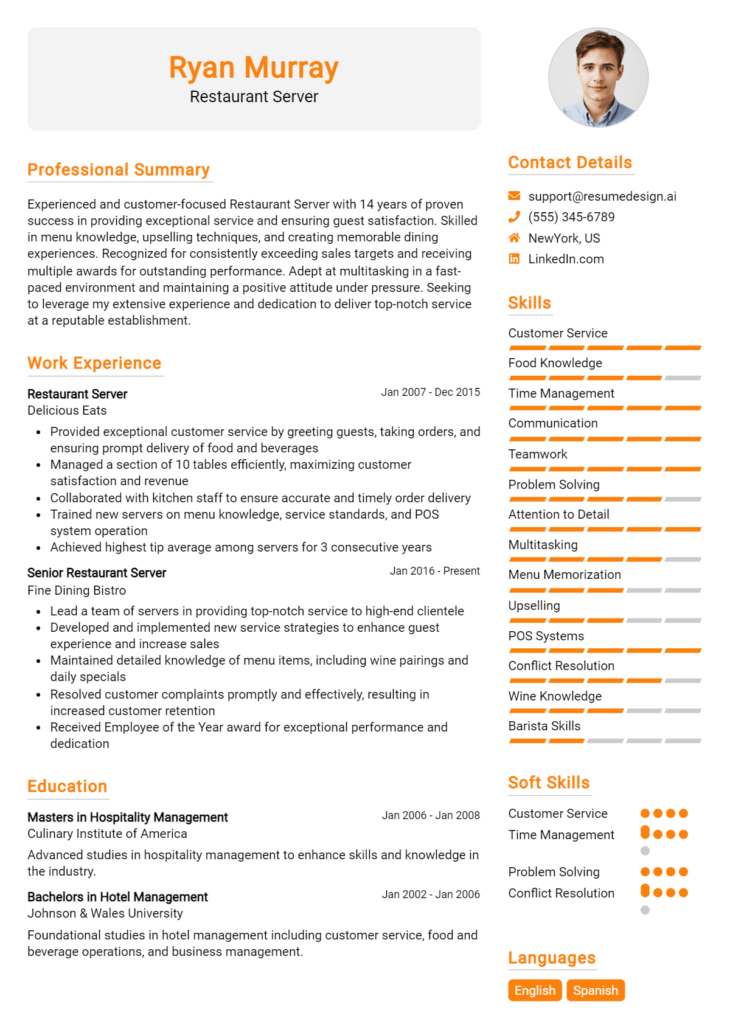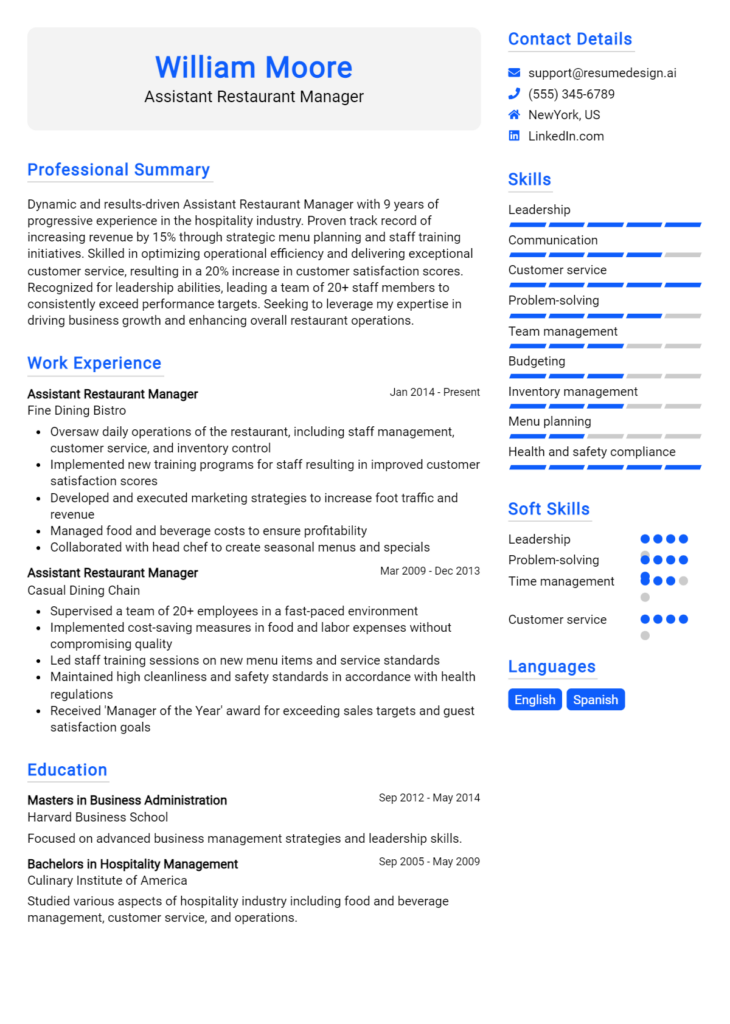Chief Security Officer Core Responsibilities
The Chief Security Officer (CSO) plays a pivotal role in safeguarding an organization’s assets by overseeing its security strategy and operations. This role requires a blend of technical expertise, operational acumen, and exceptional problem-solving skills. The CSO collaborates across departments, ensuring that security measures align with business objectives, risk management, and compliance. Proficient communication and leadership abilities are crucial for fostering a security-conscious culture. A well-structured resume can effectively highlight these qualifications, demonstrating how the CSO contributes to the organization’s overarching goals.
Common Responsibilities Listed on Chief Security Officer Resume
- Develop and implement a comprehensive security strategy.
- Conduct regular risk assessments and vulnerability analyses.
- Oversee physical and cybersecurity measures.
- Coordinate security training and awareness programs for employees.
- Manage incident response and crisis management protocols.
- Collaborate with IT, legal, and compliance departments.
- Ensure adherence to regulatory and industry standards.
- Monitor security systems and technologies for effectiveness.
- Report security metrics and risks to executive leadership.
- Develop relationships with law enforcement and external security agencies.
- Stay updated on security trends and emerging threats.
High-Level Resume Tips for Chief Security Officer Professionals
In today's competitive job market, a well-crafted resume is essential for Chief Security Officer (CSO) professionals looking to make a strong first impression. As the primary document that showcases your qualifications and career achievements, your resume serves as a critical tool in securing interviews and advancing your career. It must effectively reflect not only your skills and relevant experience but also your accomplishments in the security domain. This guide will provide practical and actionable resume tips specifically tailored for Chief Security Officer professionals, helping you stand out to potential employers.
Top Resume Tips for Chief Security Officer Professionals
- Tailor your resume to each job description by incorporating relevant keywords and phrases that align with the specific requirements of the position.
- Highlight your leadership experience, showcasing your ability to manage security teams and drive strategic initiatives.
- Quantify your achievements with metrics, such as percentage reductions in security breaches or improvements in response times, to provide concrete evidence of your impact.
- Focus on industry-specific skills such as risk assessment, incident response, compliance, and cybersecurity frameworks that are crucial for a CSO role.
- Include certifications and professional development relevant to security, such as CISSP, CISM, or other recognized credentials that demonstrate your expertise.
- Utilize a clear and professional format, ensuring that your resume is easy to read and visually appealing to make a lasting impression.
- Showcase your experience with technology and tools relevant to security management, including security information and event management (SIEM) systems.
- Incorporate a summary statement at the top of your resume that succinctly outlines your career goals and key qualifications as a Chief Security Officer.
- Emphasize your understanding of regulatory requirements and compliance standards relevant to the industry you are applying for, demonstrating your ability to navigate complex environments.
- Prioritize recent and relevant experience by placing the most impactful roles and accomplishments at the forefront of your resume.
By implementing these tips, Chief Security Officer candidates can significantly increase their chances of landing a job in this critical field. A well-structured and tailored resume not only highlights your qualifications but also showcases your strategic mindset and commitment to security excellence, making you an attractive candidate for potential employers.
Why Resume Headlines & Titles are Important for Chief Security Officer
In the competitive landscape of executive recruitment, particularly for roles such as Chief Security Officer (CSO), resume headlines and titles play a crucial role in capturing the attention of hiring managers. A powerful headline can instantly summarize a candidate’s key qualifications and convey their professional identity in a single impactful phrase. This is particularly vital for a CSO, where the responsibilities encompass safeguarding an organization's assets and reputation. Therefore, a concise and relevant resume headline that directly aligns with the job being applied for can set the tone for the entire application and significantly enhance the candidate's chances of standing out in a crowded field.
Best Practices for Crafting Resume Headlines for Chief Security Officer
- Keep it concise: Aim for one impactful phrase that captures your essence.
- Be role-specific: Use terminology that directly relates to the Chief Security Officer position.
- Highlight key strengths: Focus on your most significant skills or accomplishments.
- Incorporate metrics: If possible, include quantifiable achievements that demonstrate your impact.
- Use action-oriented language: Choose strong verbs that convey leadership and decisiveness.
- Ensure relevance: Tailor your headline to match the specific requirements of the job posting.
- Avoid jargon: Use clear and straightforward language that is easily understood.
- Reflect your value proposition: Communicate what sets you apart from other candidates.
Example Resume Headlines for Chief Security Officer
Strong Resume Headlines
Transformational Chief Security Officer with 15+ Years of Experience in Cybersecurity and Risk Management
Proven Leader in Security Strategy and Implementation, Reducing Breaches by 40% in 2 Years
Dynamic CSO Specializing in Developing Comprehensive Security Frameworks for Fortune 500 Companies
Weak Resume Headlines
Experienced Security Professional
Chief Security Officer Looking for New Opportunities
The strong headlines are effective because they provide a clear, specific, and impactful summary of the candidate's qualifications, immediately highlighting their value to potential employers. They incorporate measurable achievements and relevant industry terminology, making them relatable and appealing. In contrast, the weak headlines fail to impress due to their vagueness and lack of specificity, offering little insight into the candidate's skills or accomplishments. Such generic phrases do not distinguish the candidate in a competitive field, thereby diminishing their chances of making a memorable impression.
Writing an Exceptional Chief Security Officer Resume Summary
A well-crafted resume summary is crucial for a Chief Security Officer (CSO) as it serves as the first impression for potential employers. This brief yet powerful statement quickly captures the attention of hiring managers by highlighting key skills, relevant experience, and notable accomplishments that align with the job role. An impactful summary should be concise and tailored specifically to the position being applied for, effectively showcasing the candidate's qualifications and setting the tone for the rest of the resume.
Best Practices for Writing a Chief Security Officer Resume Summary
- Quantify Achievements: Use specific numbers or percentages to demonstrate the impact of your work.
- Focus on Skills: Highlight essential skills relevant to the CSO role, such as risk management, cybersecurity, and compliance.
- Tailor for the Job Description: Customize your summary to reflect the language and requirements of the job listing.
- Highlight Leadership Experience: Emphasize your ability to lead teams and manage security initiatives effectively.
- Showcase Technical Expertise: Include relevant technical skills and knowledge of industry standards.
- Keep it Concise: Aim for 2-4 sentences that deliver maximum impact without overwhelming the reader.
- Use Action-Oriented Language: Start with strong action verbs to convey authority and confidence.
- Reflect Industry Trends: Incorporate relevant trends or challenges in security management to demonstrate your awareness of the field.
Example Chief Security Officer Resume Summaries
Strong Resume Summaries
Dynamic Chief Security Officer with over 10 years of experience in risk management and cybersecurity; successfully reduced security breaches by 40% through implementing a comprehensive security training program for employees.
Results-driven CSO with a proven track record in leading cross-functional teams to enhance organizational security posture; spearheaded a $1.5 million security overhaul that improved compliance rates by 30% across all departments.
Accomplished Chief Security Officer with expertise in regulatory compliance and incident response; recognized for developing a proactive threat intelligence program that decreased incident response times by 25%.
Strategic leader in security management with 15 years of experience; adept at leveraging data analytics to identify vulnerabilities, resulting in a 50% reduction in risk exposure over three years.
Weak Resume Summaries
Experienced security professional looking for a new opportunity to utilize skills.
Chief Security Officer with knowledge of cybersecurity and risk management, seeking a challenging position.
The examples above illustrate the distinction between strong and weak resume summaries effectively. The strong summaries demonstrate quantifiable outcomes, specific skills, and clear relevance to the role of a Chief Security Officer, making them compelling to hiring managers. In contrast, the weak summaries are vague and generic, lacking any measurable impact or specific qualifications, which diminishes their ability to capture attention.
Work Experience Section for Chief Security Officer Resume
The work experience section of a Chief Security Officer (CSO) resume is critical in demonstrating the candidate's technical expertise, leadership capabilities, and ability to deliver high-quality security solutions. This section allows candidates to showcase their hands-on experience in managing security teams, implementing advanced security measures, and ensuring compliance with industry regulations. By quantifying achievements—such as reduced incidents of data breaches or improved response times—and aligning their experience with industry standards, candidates can effectively illustrate their value to potential employers and their readiness to tackle complex security challenges.
Best Practices for Chief Security Officer Work Experience
- Highlight specific technical skills relevant to security frameworks, tools, and technologies.
- Quantify achievements with metrics, such as percentage reductions in incidents or cost savings.
- Demonstrate effective team management and leadership in security initiatives.
- Include examples of collaboration with other departments, such as IT and compliance.
- Tailor experiences to align with the job description and preferred qualifications of prospective employers.
- Focus on continuous improvement initiatives and proactive risk management strategies.
- Showcase certifications and training that reinforce technical proficiency.
- Use action verbs to convey impact and assertiveness in previous roles.
Example Work Experiences for Chief Security Officer
Strong Experiences
- Led a team of 15 security professionals to implement a new security protocol that reduced data breaches by 40% over two years.
- Developed and executed a comprehensive cybersecurity training program that enhanced employee awareness and reduced phishing incidents by 60%.
- Collaborated with IT and legal teams to achieve 100% compliance with GDPR within a 12-month period, minimizing potential fines.
- Implemented advanced threat detection systems, resulting in a 50% improvement in response times to security incidents.
Weak Experiences
- Responsible for security measures.
- Worked on various projects related to security.
- Involved in team discussions about security issues.
- Helped to improve security processes.
The examples listed as strong experiences are considered effective because they provide specific, quantifiable outcomes that demonstrate leadership, technical skills, and successful collaboration. Each point clearly outlines the candidate's contributions and the positive impact of their actions. In contrast, the weak experiences lack detail and specificity, making it difficult to assess the candidate's true capabilities or achievements. They do not convey a sense of impact or value, which can detract from a candidate's competitiveness in the job market.
Education and Certifications Section for Chief Security Officer Resume
The education and certifications section of a Chief Security Officer (CSO) resume plays a crucial role in establishing the candidate's authority and expertise within the field of security management. This section not only showcases the candidate's academic background but also highlights industry-relevant certifications and their commitment to continuous professional development. By providing details on relevant coursework, specialized training, and recognized certifications, candidates can significantly enhance their credibility and demonstrate alignment with the demands of the CSO role. An effectively crafted education and certifications section can set a candidate apart in a competitive job market, showing potential employers that they possess both the theoretical knowledge and practical skills necessary to safeguard organizational assets.
Best Practices for Chief Security Officer Education and Certifications
- Prioritize relevant degrees, such as a Master's in Cybersecurity or Information Security Management.
- List industry-recognized certifications like CISSP, CISM, or CISA to validate expertise.
- Include specialized training related to risk assessment, incident response, and compliance regulations.
- Be concise but detailed; provide specific coursework that aligns with security management roles.
- Highlight any advanced degrees or ongoing education initiatives to showcase a commitment to learning.
- Use a clear format that makes it easy for hiring managers to assess qualifications at a glance.
- Incorporate any relevant workshops, seminars, or conferences attended to demonstrate engagement in the industry.
- Consider mentioning any teaching or mentoring roles in educational settings to emphasize subject matter expertise.
Example Education and Certifications for Chief Security Officer
Strong Examples
- M.S. in Cybersecurity, University of Technology, 2020
- CISSP (Certified Information Systems Security Professional), 2021
- CISM (Certified Information Security Manager), 2022
- Risk Management Framework (RMF) Training, 2023
Weak Examples
- B.A. in History, University of Arts, 2010
- Certification in Basic Computer Skills, 2015
- Certificate in First Aid, 2018
- High School Diploma, 2005
The strong examples listed above are considered relevant as they directly align with the requirements and expectations of a Chief Security Officer, showcasing advanced degrees and industry-recognized certifications that demonstrate expertise in the field. In contrast, the weak examples highlight qualifications that lack relevance to the CSO role, such as degrees in unrelated fields and certifications that do not contribute to the candidate's security management capabilities. This distinction underscores the importance of carefully selecting educational credentials that enhance the candidate's profile in the security domain.
Top Skills & Keywords for Chief Security Officer Resume
As the landscape of cybersecurity continues to evolve, the role of a Chief Security Officer (CSO) has become increasingly critical in safeguarding an organization’s assets and data. A well-crafted resume for a CSO position should emphasize both hard and soft skills that highlight the candidate's ability to navigate complex security challenges. Skills not only showcase an applicant's qualifications but also reflect their capacity to lead security initiatives, manage teams, and respond to threats effectively. This balance of competencies is essential for establishing a robust security posture and ensuring compliance with industry regulations.
Top Hard & Soft Skills for Chief Security Officer
Soft Skills
- Leadership
- Strategic Thinking
- Communication
- Problem-Solving
- Risk Management
- Team Collaboration
- Adaptability
- Decision-Making
- Conflict Resolution
- Emotional Intelligence
Hard Skills
- Cybersecurity Architecture
- Incident Response Planning
- Regulatory Compliance (e.g., GDPR, HIPAA)
- Threat Intelligence Analysis
- Vulnerability Assessment
- Security Information and Event Management (SIEM)
- Network Security Protocols
- Data Loss Prevention (DLP) Techniques
- Security Audits and Assessments
- Cloud Security Management
By incorporating these skills into a Chief Security Officer resume, candidates can effectively demonstrate their readiness for the role. Alongside relevant work experience, these skills will significantly enhance the overall appeal of the resume, positioning the candidate as a strong contender in the competitive field of security leadership.
Stand Out with a Winning Chief Security Officer Cover Letter
Dear [Hiring Manager's Name],
I am writing to express my interest in the Chief Security Officer position at [Company Name], as advertised on [where you found the job listing]. With over [X years] of extensive experience in security management and risk assessment, coupled with a deep understanding of both physical and cybersecurity measures, I am excited about the opportunity to contribute to your organization’s safety and resilience. My strategic approach to security and my ability to lead cross-functional teams would help [Company Name] to protect its assets and enhance its reputation as a leader in the industry.
In my previous role as [Previous Job Title] at [Previous Company Name], I successfully developed and implemented a comprehensive security strategy that reduced security incidents by over [X%] within the first year. By leveraging advanced technologies and fostering a culture of security awareness among employees, I ensured that our defenses were robust against evolving threats. I also spearheaded initiatives to conduct regular threat assessments and security audits, which led to the identification and mitigation of potential vulnerabilities. I am particularly proud of my ability to forge strong partnerships with law enforcement and emergency response teams, ensuring a coordinated approach to incident management.
At [Company Name], I am particularly impressed by your commitment to innovation and excellence. I am eager to bring my expertise in developing proactive security protocols and crisis management plans that align with your organizational goals. My experience in managing large teams and collaborating with various stakeholders will allow me to effectively communicate security priorities and engage all employees in a collective effort to maintain a secure environment. I am confident that my strategic vision and hands-on leadership style will make a significant contribution to your security operations.
Thank you for considering my application. I am looking forward to the opportunity to discuss how my background, skills, and enthusiasms align with the goals of [Company Name]. I am excited about the possibility of contributing to the safety and security of your organization and would welcome the chance to further discuss my fit for this pivotal role.
Sincerely,
[Your Name]
[Your Phone Number]
[Your Email Address]
Common Mistakes to Avoid in a Chief Security Officer Resume
When crafting a resume for a Chief Security Officer (CSO) position, it's crucial to present a polished and professional image that highlights your strategic security expertise and leadership skills. However, many candidates make common mistakes that can undermine their chances of landing an interview. Understanding these pitfalls can help you create a more effective resume that stands out to hiring managers.
Ignoring Keywords: Failing to include relevant industry keywords can lead to your resume being filtered out by applicant tracking systems. Tailor your resume to match the specific language and requirements mentioned in the job description.
Overloading with Technical Jargon: While technical expertise is important, excessive jargon can alienate non-technical readers. Strive for a balance that showcases your skills without overwhelming the reader.
Lack of Quantifiable Achievements: Focusing solely on responsibilities rather than accomplishments can diminish your impact. Use metrics and specific examples to demonstrate how you've improved security measures or reduced risks.
Neglecting Leadership Experience: As a CSO, leadership is paramount. Failing to highlight your leadership roles, team management experience, and decision-making capabilities can make your resume less compelling.
Using Generic Objectives: A generic objective statement does not differentiate you from other candidates. Instead, personalize your objective to reflect your specific goals and how they align with the company's mission.
Inconsistent Formatting: Poor formatting can detract from the professionalism of your resume. Use consistent fonts, sizes, and bullet points to ensure easy readability and a polished look.
Failing to Update Regularly: An outdated resume can give the impression that you are not current with industry trends or advancements. Regularly updating your resume ensures it reflects your most recent achievements and skills.
Omitting Soft Skills: While technical skills are critical, soft skills such as communication, negotiation, and crisis management are equally important for a CSO. Ensure you highlight these abilities to provide a well-rounded view of your capabilities.
Conclusion
In today's rapidly evolving security landscape, the role of the Chief Security Officer (CSO) has become increasingly critical. As organizations face a growing number of cyber threats and vulnerabilities, the responsibilities of a CSO encompass not only the protection of physical assets but also the safeguarding of sensitive information and data.
Key points discussed include the importance of risk management, compliance with regulatory requirements, and the implementation of robust security policies. Effective communication and collaboration with other departments are essential for fostering a security-conscious culture within the organization. Additionally, a CSO must stay ahead of emerging threats by continuously updating security strategies and leveraging the latest technologies.
As you reflect on the insights shared in this article, consider the significance of presenting your qualifications effectively. If you are preparing or updating your Chief Security Officer resume, now is the perfect time to take action. Utilize available tools to enhance your resume's impact. Explore resume templates to find a design that suits your style, or try the resume builder for a step-by-step approach to creating a professional document. Review resume examples to gather inspiration from successful CSOs, and don’t forget to craft a compelling introduction with our cover letter templates.
Take the next step in your career by ensuring your resume reflects the expertise and leadership qualities that are essential for a Chief Security Officer.

